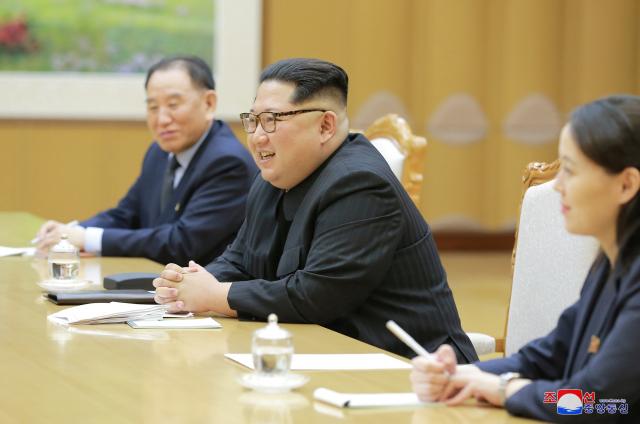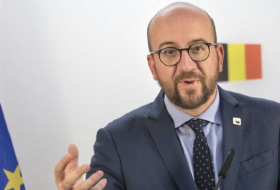The United States, South Korea and China responded with cautious optimism about North Korea’s willingness to talk, a development that follows months of insults and threats of war between Trump and the North.
But some U.S. and South Korean officials said a breakthrough on the Trump administration’s top national-security challenge remained unlikely after the failure of previous talks, adding that North Korea may be trying to buy time to develop its weapons programs and seek relief from punishing American and U.N. sanctions.
“Possible progress being made in talks with North Korea,” Trump wrote on Twitter. “For the first time in many years, a serious effort is being made by all parties concerned. The World is watching and waiting! May be false hope, but the U.S. is ready to go hard in either direction!”
Vice President Mike Pence said the United States would continue to apply “maximum pressure” on North Korea and that all options were “on the table” until Washington sees evidence that the reclusive country was taking steps toward denuclearization.
There was no immediate comment from Pyongyang.
The news came as a South Korean delegation returned from a first-ever meeting with North Korean leader Kim Jong Un in Pyongyang on Monday.
The two sides next month will hold their first summit since 2007 at the border village of Panmunjom, said Chung Eui-yong, the head of the South Korean delegation.
“North Korea made clear its willingness to denuclearize the Korean peninsula and the fact there is no reason for it to have a nuclear program if military threats against the North are resolved and its regime is secure,” Chung told a media briefing.
Chung cited North Korea as saying it would not carry out nuclear or missile tests while talks with the international community were under way. North Korea has not carried out any such tests since last November. North Korea also is willing to discuss normalizing ties with the United States, Chung said.
Tensions have eased significantly between North and South Korea since the Winter Olympics in the South last month, even though the countries are technically still at war because their 1950-53 conflict ended in a truce rather than a peace treaty.
Since North Korea pulled out of so-called six-party denuclearization talks in 2009, Pyongyang has developed new nuclear capabilities. It tested its largest-ever intercontinental ballistic missile in November, which it said could reach all of the U.S. mainland.
China encouraged North and South Korea to continue reconciliation efforts.
Despite skepticism about Pyongyang’s intentions, the prospect of talks represents a significant potential development after heightened tensions and rhetoric between Kim and Trump, who last August threatened “fire and fury” if the North threatened the United States again.
White House national security adviser H.R. McMaster and other Trump administration officials are due to meet later this week with South Korean officials, including the South Korean national security adviser, two White House officials said.
Global stock markets rose on the news about North Korea. The broadest gauge of shares, MSCI’s All Country World Index, rose 0.7 percent.
‘TREASURED SWORD’
North Korea has vowed never to give up its nuclear program, which it calls a “treasured sword” against a possible U.S. invasion. The United States stations 28,500 troops in South Korea but denies any invasion plans.
If Pyongyang demands the departure of those troops, that could render any summit talk impossible, a South Korean government official said. “If the North were to move things forward, they would present something more realistic and doable,” said the official, who spoke on condition of anonymity.
In Washington, U.S. intelligence officials said it was too early to assess North Korea’s willingness on denuclearization.
“Hope springs eternal but we need to learn a lot more relative to these talks. And we will,” U.S. Director of National Intelligence Dan Coats told a Senate Armed Services hearing.
Lieutenant General Robert Ashley, director of the U.S. Defense Intelligence Agency, told the same hearing he did not share a sense of optimism, adding, “That’s kind of a ‘show me,’ and so we’ll see how this plays out.”
Satellite images from last week indicate North Korea may have resumed plutonium production, presumably for its weapons program, according to Washington-based monitoring program 38 North.
Several U.S. officials who follow events on the Korean peninsula cautioned against getting too optimistic, saying there was no indication Pyongyang has abandoned its nuclear ambitions.
North Korea has a history of encouraging diplomacy in an effort to ease pressure from the international community, but those efforts so far have borne little fruit, they said.
As a result, the Trump administration is assessing the overture with “extreme caution,” one official said, adding it was premature to decide on a U.S. negotiator or even the level at which such talks might occur.
Matt Pottinger, Trump’s senior Asia adviser on the National Security Council, is playing a central role in coordinating the administration’s response, including consultations with allies, the official said.
Still, it would be irresponsible not to pursue a potential opening, said Daniel Russel, a former assistant U.S. secretary of state for East Asia. “We have to keep both our cynicism and our optimism in check in dealing with North Korea,” Russel said.
More about: #North-Korea
















































